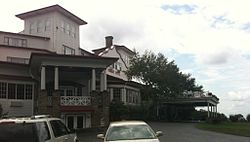Jumonville
Buildings and structures in Fayette County, PennsylvaniaChristian summer campsMethodist organizationsMethodist stubs
Jumonville is a United Methodist camp and retreat center located in Fayette County, Pennsylvania, United States, near the city of Uniontown, PA. Jumonville features a 60-foot-tall cross that stands on top of Dunbar's Knob on Chestnut Ridge. Jumonville is named after Joseph Coulon de Villiers de Jumonville, who was killed during a skirmish with George Washington at the Battle of Jumonville Glen that set off the French and Indian War.
Excerpt from the Wikipedia article Jumonville (License: CC BY-SA 3.0, Authors).Jumonville
Jumonville Road, North Union Township
Geographical coordinates (GPS) Address Nearby Places Show on map
Geographical coordinates (GPS)
| Latitude | Longitude |
|---|---|
| N 39.88757 ° | E -79.6496 ° |
Address
Jumonville Road 898
15445 North Union Township
Pennsylvania, United States
Open on Google Maps





